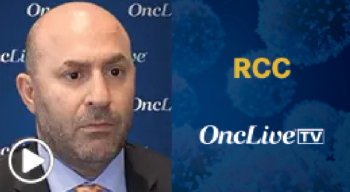
Expert panelists delve into multicancer early detection testing and discuss its potential to revolutionize cancer screening, close healthcare gaps, and complement standard care approaches.

Your AI-Trained Oncology Knowledge Connection!


Expert panelists delve into multicancer early detection testing and discuss its potential to revolutionize cancer screening, close healthcare gaps, and complement standard care approaches.

Loss of the “housekeeping” gene methylthioadenosine phosphorylase, or MTAP, is a common event in cancer.

Oncology experts discuss the platinum chemotherapy shortage in the United States.

Rinath M. Jeselsohn, MD, discusses enrollment criteria for the phase 3 VERITAC-2 trial, as well as the potential clinical implications of this research for patients with advanced estrogen receptor–positive/HER2-negative metastatic breast cancer.

Toni K. Choueiri, MD, discusses the benefit of ongoing investigations in metastatic, advanced renal cell carcinoma.

New research from Dana-Farber Cancer Institute researcher Cigall Kadoch, PhD, along with colleagues at Princeton University and Washington University in St. Louis, reveals a key role for intrinsically disordered proteins known as IDRs that are implicated in a wide range of human diseases, from cancer to neurodegeneration

Patients with breast cancer who received hypofractionated postmastectomy radiotherapy experienced similar toxicities vs those who received conventionally fractionated postmastectomy radiotherapy, according to a presentation shared at the 2023 American Society for Radiation Oncology Annual Meeting.

Dr Richardson discusses the background of mezigdomide, key efficacy and safety findings with the agent plus dexamethasone in patients with relapsed/refractory multiple myeloma, and the implications of this combination for heavily pretreated patients in this population.

Biagio Ricciuti, MD, discusses the association between PD-L1 expression levels and long-term survival with anti–PD-L1 monotherapy in patients with advanced non–small cell lung cancer.

Treatment with teclistamab-cqyv in real-world patients with relapsed/refractory multiple myeloma elicited similar efficacy results and a comparable safety profile to findings from the phase 1/2 Majes-TEC-1 trial.

Explore critical issues surrounding health disparities in cancer screening, as discussed by experts, and the urgent need to bridge gaps in access, trust, and follow-up care for underserved populations.

A panel of esteemed cancer experts explore the challenges and opportunities in cancer screening and identification, shedding light on the evolving landscape and its impact on clinical practice.

Use of the novel T-charge rapid manufacturing platform for the production of durcabtagene autoleucel CAR T cells within 2 days was successful in producing rapid and robust in vivo expansion, as well as long-term T-cell persistence in patients with relapsed/refractory multiple myeloma, according to a correlative analysis of data from an ongoing phase 1 trial presented at the 2023 IMS Annual Meeting.

Treatment with the combination of isatuximab, carfilzomib, lenalidomide, and dexamethasone generated high rates of minimal residual disease negativity in patients with newly diagnosed, high-risk multiple myeloma, irrespective of transplant status.

A team of Dana-Farber researchers has identified a potential new way to assess clinically valuable features of clear cell renal cell carcinoma, a form of kidney cancer, using image processing with deep learning.

The panel closes by reviewing the patient case once more and shares clinical pearls on the treatment of patients with GVHD.

Pasi A. Jänne, MD, PhD, discusses key findings from the primary analysis of the phase 2 DESTINY-Lung02 trial in patients with HER2-mutant non–small cell lung cancer.

Alessandro Di Federico, MD, discusses findings from a study investigating the correlation between TTF-1 expression and outcomes with immunotherapy-based treatments in patients with lung adenocarcinoma.

A new agent that subverts myeloma cells from within while also subjecting them to an immune system attack produced impressive responses in combination with dexamethasone in patients with multiple myeloma that had relapsed and stopped responding to all currently available therapies

Jia Luo, MD, discusses a retrospective analysis of initial chemotherapy regimens for the treatment of patients with locally advanced and metastatic NUT carcinoma, which was presented at the 2023 IASLC World Conference on Lung Cancer.

Dr Gooptu highlights how she selects therapy for a patient who is refractory to steroids for chronic GVHD and Dr Inyang notes the adverse events seen with these therapies.

GVHD experts outline the treatment options for patients with steroid-refractory chronic GVHD.

Dana-Farber Cancer Institute and Beth Israel Deaconess Medical Center announced plans for a comprehensive new collaboration designed to advance the future of cancer care and build the region’s only independent, free-standing inpatient hospital for adult cancer patients.

Paul G. Richardson, MD, discusses how the continued development of the novel agent mezigdomide could affect the treatment paradigm for patients who progressed on, and developed resistance to, other available BCMA-directed therapies.

Osimertinib in combination with platinum-based therapy and pemetrexed demonstrated a statistically significant and clinically meaningful improvement in progression-free survival vs osimertinib monotherapy in patients with EGFR-mutated advanced non–small cell lung cancer.

Details of steroid use for chronic GVHD, including taper and response criteria, are described by the panel.

The panel provides an overview of the frontline treatments available for chronic GVHD.

Pasi A. Jänne, MD, PhD, discusses findings from the phase 3 FLAURA2 trial in patients with EGFR-mutant non–small cell lung cancer.

Sara M. Tolaney, MD, MPH, highlights updated survival and safety data seen with sacituzumab govitecan in patients with hormone receptor–positive, HER2-negative breast cancer; underscores how Trop-2 and HER2 testing is not necessarily needed for this agent in this population at this time; and shares how ongoing efforts are exploring the utilization of this agent earlier in the treatment course.

Interim data from the phase 3 CABINET trial demonstrated significant improvement in progression-free survival with cabozantinib vs placebo in patients with advanced pancreatic or extra-pancreatic neuroendocrine tumors following progression on prior systemic therapy.